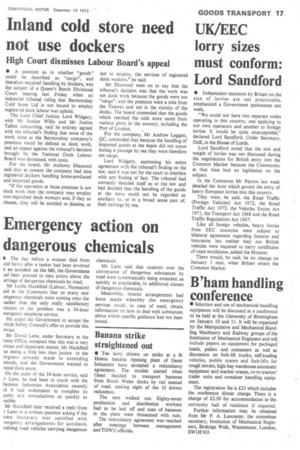Inland cold store need not use dockers
Page 19

If you've noticed an error in this article please click here to report it so we can fix it.
High Court dismisses Labour Board's appeal
• A question as to whether "goods" could be described as "cargo", and therefore required handling by dockers, was the subject of a Queen's Bench Divisional Court hearing last Friday when an industrial tribunal ruling that Bermondsey Cold Store Ltd is not bound to employ registered dock labour was upheld, The Lord Chief Justice, Lord Widgery, with Mr Justice Willis and Mr Justice Talbot concurring, said he entirely agreed with the tribunal's finding that none of the work done at the Bermondsey company's premises could be defined as dock work, and an appeal against the tribunal's decision brought by the National Dock Labour Board was dismissed, with costs.
For the board, Mr Anthony Diamond said that at present the company had nine registered dockers handling home-produced and imported goods.
"If the operation at these premises is not dock work then the company may employ non-registered dock workers and, if they so choose, they will be entitled to dismiss, or not to employ, the services of registered dock workers," he said.
Mr Diamond went on to say that the tribunal's decision was that the work was not dock work because the goods were not "cargo", and the premises were a mile from the Thames and not in the vicinity of the docks. The board contended that the goods which reached the cold store came from various ports in the country, including the Port of London.
For the company, Mr Andrew Leggatt, QC, contended that because the handling of imported goods at the depot did not occur during a passage by sea they were therefore not cargo.
Lord Widgery, expressing his entire agreement with the tribunal's finding on the law, said it was not for the court to interfere with any finding of fact. The tribunal had correctly directed itself as to the law and had decided that the handling of the goods at the store could not be regarded as ancillary to, or in a broad sense part of, their carriage by sea.




































































































